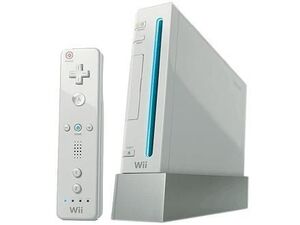No edit summary |
No edit summary |
||
| Line 1: | Line 1: | ||
[[File:Lt wii.jpg|thumb|300px|An original Wii with a Wii Remote]] |
[[File:Lt wii.jpg|thumb|300px|An original Wii with a Wii Remote]] |
||
'''Wii''' (/ˈwiː/) is a home video game console released by [[Nintendo]] on November 19, 2006. As a seventh-generation console, the Wii competes with [[Microsoft]]'s [[Xbox 360]] and Sony's PlayStation 3. Nintendo states that its console targets a broader demographic than that of the two others. The Wii has backwards compatibility with all [[GameCube|Nintendo GameCube]] games and their controllers. The main feature of the Wii was the Wii Remote, a wireless controller that allows for motion play via the gyro in the remote. The remote requires two AA batteries to function or a third-party rechargeable battery pack, although the latter is not officially licensed by Nintendo. Unlike wired controllers, the Wii Remote can be damaged if the batteries leak alkaline into the motherboard if the batteries are kept inside the remote too long. |
'''Wii''' (/ˈwiː/) is a home video game console released by [[Nintendo]] on November 19, 2006. As a seventh-generation console, the Wii competes with [[Microsoft]]'s [[Xbox 360]] and Sony's PlayStation 3. Nintendo states that its console targets a broader demographic than that of the two others. The Wii has backwards compatibility with all [[GameCube|Nintendo GameCube]] games and their controllers. The main feature of the Wii was the Wii Remote, a wireless controller that allows for motion play via the gyro in the remote. The remote requires two AA batteries to function or a third-party rechargeable battery pack, although the latter is not officially licensed by Nintendo. Unlike wired controllers, the Wii Remote can be damaged if the batteries leak alkaline into the motherboard if the batteries are kept inside the remote too long. |
||
| + | |||
| + | The Wii discs are region-locked, meaning that a game released in the PAL region can only be played with Wii consoles released in the PAL region. All the Wii Remotes and their accessories are region-free, meaning they can be played on any console, regardless of where it was released for. |
||
==Wii accessories, Wii Mini and Wii Family Edition== |
==Wii accessories, Wii Mini and Wii Family Edition== |
||
Revision as of 19:52, 16 December 2018

An original Wii with a Wii Remote
Wii (/ˈwiː/) is a home video game console released by Nintendo on November 19, 2006. As a seventh-generation console, the Wii competes with Microsoft's Xbox 360 and Sony's PlayStation 3. Nintendo states that its console targets a broader demographic than that of the two others. The Wii has backwards compatibility with all Nintendo GameCube games and their controllers. The main feature of the Wii was the Wii Remote, a wireless controller that allows for motion play via the gyro in the remote. The remote requires two AA batteries to function or a third-party rechargeable battery pack, although the latter is not officially licensed by Nintendo. Unlike wired controllers, the Wii Remote can be damaged if the batteries leak alkaline into the motherboard if the batteries are kept inside the remote too long.
The Wii discs are region-locked, meaning that a game released in the PAL region can only be played with Wii consoles released in the PAL region. All the Wii Remotes and their accessories are region-free, meaning they can be played on any console, regardless of where it was released for.
Wii accessories, Wii Mini and Wii Family Edition
The Wii was succeeded by the Wii U in 2012, which supports all Wii accessories, such as the Wii Remote Nunchuk and the Wii Classic Controller and has backwards compatibility with most Wii games, except the ones that require the Nintendo GameCube slots. No Looney Tunes games for home consoles have been released since the Nintendo Wii due to low sales and mixed to negative reception.
The Wii had several models, including Wii Mini and Wii Family Edition, both released in 2011. The original Wii was discontinued in 2011. The Wii Mini and Wii Family Edition do not have backwards compatibility with GameCube games and controllers and cannot play Wii games that require the GameCube controller slots.
The Wii was a financial success for Nintendo. About 101 million units of the Nintendo Wii, including Wii Mini and Wii Family Edition, were sold. The Wii U, the successor to the Wii, was a failed console for Nintendo, only selling about 14 million units.
